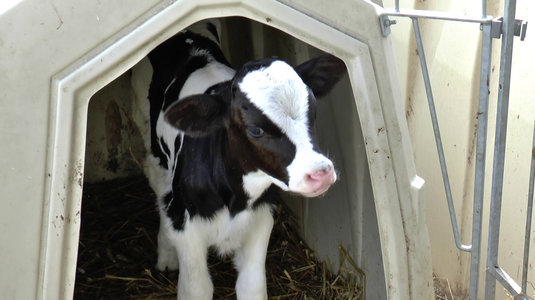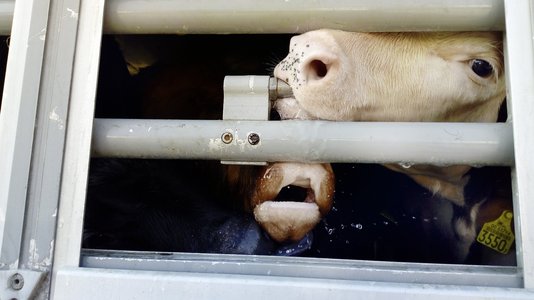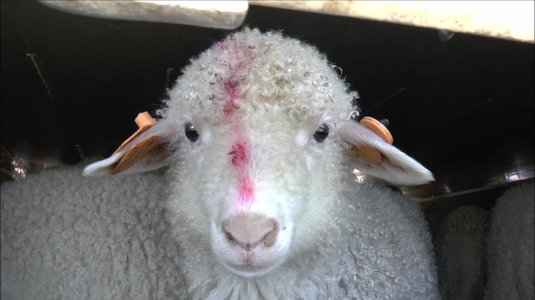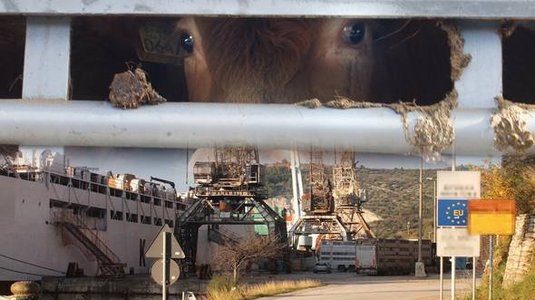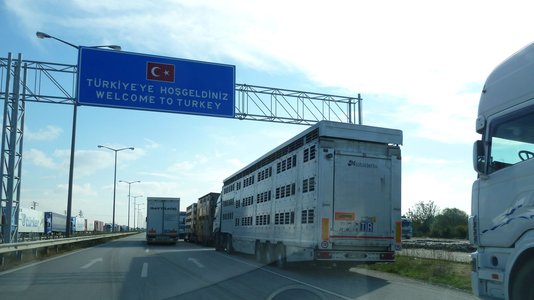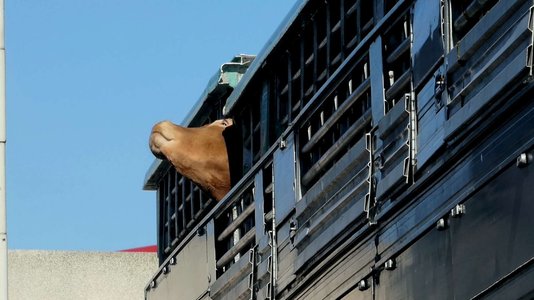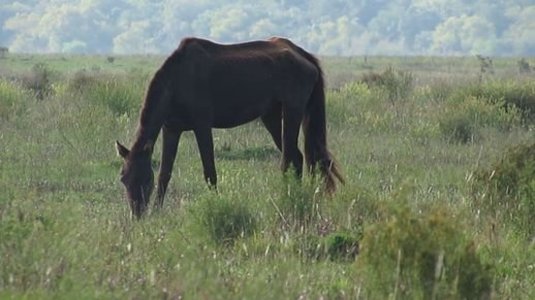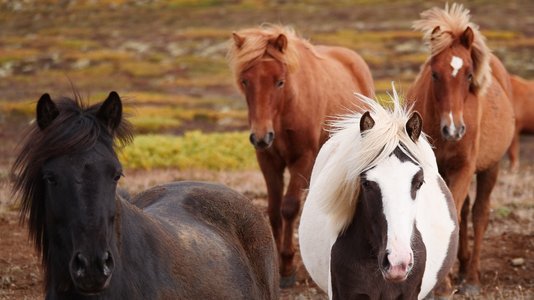Dossiers
Contribution of assembly centres and control posts to starvation times of calves
Contribution of assembly centres and control posts to starvation times of calves
Our teams investigated the long distance transport of unweaned calves in Europe on six different routes, with nine different assembly centers and control posts involved:
1. Executive Summary
Our observations during transport of unweaned calves on different routes in Europe shows that the animals are suffering from thirst and hunger for prolonged periods of time. It is an open secret that during long journeys, unweaned calves are not receiving liquid supply on board the vehicles. Aggravating to this situation, most assembly centres in their role as “place of departure” and/or “place of destination” are also not providing feed (milk, milk replacer) to the animals. Even during the required 24-hour rest at control posts, unweaned calves are often not fed, but only given electrolytes, once during their rest of usually less than 12 hours. The industry is claiming that unweaned calves cannot cope well with milk/milk replacer intake during the journey, but at centre stage are purchasers’ wishes to receive animals with a clean coat.
Due to the lack of access to cross-border data and with competent authorities turning a blind eye, assembly centre hopping between member states has become a common practice, posing a high risk to the welfare and the health of the calves, during repeated loading and unloading procedures and lack of feed and rest.
This results in starvation times for unweaned calves exceeding 50 hours on the transport routes observed. It does not include though the feed deprivation of calves during their transfer from the farm of origin to the assembly centre for export, resulting easily in additional 24 hours without milk meal.
The calves observed during our investigations were mooing loudly and licking the side walls of trucks or even suckled other calves’ bellies or tails – a clear sign of thirst and hunger.
2. Introduction
Article 3 of Council Regulation (EC) 1/2005 requires that transported animals are supplied according to their needs, and food and water is given to them during rest periods. For unweaned calves, animals still on a milk diet, this means the supply of milk or milk replacer. This core element of the Regulation is systematically disregarded during transport of unweaned calves.
The transport and resting periods of Regulation 1/2005 for long journeys of unweaned animals are nine hours of transport – minimum of one hour rest to provide water and feed – nine hours of transport, followed by 24 hours of rest at a control post. The binding requirement, the onboard supply of the animals with liquid/feed, cannot be put into practice in the case of unweaned animals, because it is practically impossible to feed all calves onboard a vehicle with electrolyte or milk.
Due to this, long journeys of unweaned animals are often not approved by authorities strictly applying the requirements of Regulation 1/2005.
Unfortunately, unweaned calves are still transported to their far away destinations by illegal assembly centre hopping. This practice involves several unloadings and loadings at different assembly centres, putting the welfare of the vulnerable calves at very high risk.
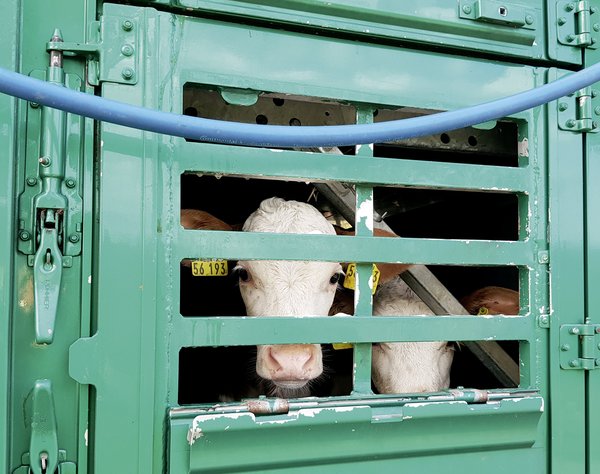
3. Case Study: Long Journey Czech Republic to Spain, via control post in Soppe-le-Bas
The route from the Czech Republic to Spain is one out of six long-distance transport routes of unweaned calves which our teams have investigated. Information on the other routes are available on request.
Background information:
In 2021 and 2022, we trailed Polish transporters loaded with Czech and Slovakian unweaned calves, to observe if feeding and resting times are respected. The calves were carried from Czech Republic to Spain, with a stop at the control post of Sarl Alsabest in Soppe-le-Bas (France).
Observations:
During the first trailing on 10th of November 2021, we observed the Polish company MARKON, lic. pl. PSZ TK 91, at 16:10 h close to the Czech-German border. The truck had departed with 223 Czech unweaned calves from Czech Republic. Until arrival at the control post Sarl Alsabest in Soppe-le-Bas at 23:54 h, the drivers only stopped twice for 10 minutes, and the animals were not supplied with liquid. During unloading of calves at the control post, at 00:13 h on 11th, another truck of the company KONRAD, lic. pl. BL 3890 P, arrived, loaded with 255 unweaned calves. All calves from both trucks were unloaded until 01:03 h.
One minute later, all lights at the control post were switched off, the calves mooing constantly during the night. The calves were possibly supplied with electrolyte solution in the morning before loading at 11:00 h. After only 10 hours of rest, all calves were loaded and both trucks left the control post with direction to Spain.During the next observation on the 8th of December 2021 at the same control post, again trucks of the companies MARKON, lic. pl. PSZ TK 91, and KONRAD, lic. pl. BL 3890 P, arrived at 23:54 h. Unloading of both trucks was finished one hour later. Again, the lights were turned off immediately after all calves had entered the control post and feeding was practically impossible. On the 9th of December at 7:30 h, one person (the operator Pascal Liller) arrived at the control post. He filled up the drinkers in the feeding area with electrolyte solution and opened pen after pen. After only 1.5 hours, he stopped his activities, but of course not all of the approximately 400 calves had received liquid, because no one had assisted smaller calves with drinking and some pens with calves were forgotten altogether. At 13:15 h on the same day, after only 12 hours and only one supply with electrolytes, the calves were loaded on both trucks and left the control post to continue to Spain.
Calves in different assembly centres / control posts:
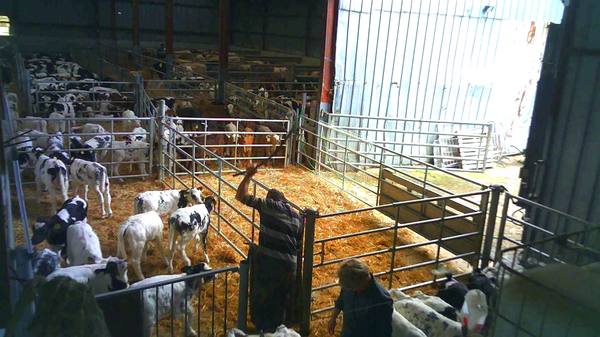
Findings:
We don’t have information on the last milk meal the calves had before they entered the place of departure in Czech Republic. We also don’t know if calves were supplied with milk or electrolytes at the assembly centre. However, most assembly centres only supply calves with electrolytes. The animals were deprived from feed for a minimum of 35 hours.
From CZ to ES, unweaned calves suffered from thirst and hunger, due to
- impracticability to water and feed unweaned calves onboard the vehicles,
- calves have not received liquid after 9 hours of transport.
- vehicles with inadequate drinking systems for unweaned calves,
- a single supply with electrolyte solution at the control post in Soppe-le-Bas,
- practice to only supply calves with electrolyte solution at assembly centres in Spain
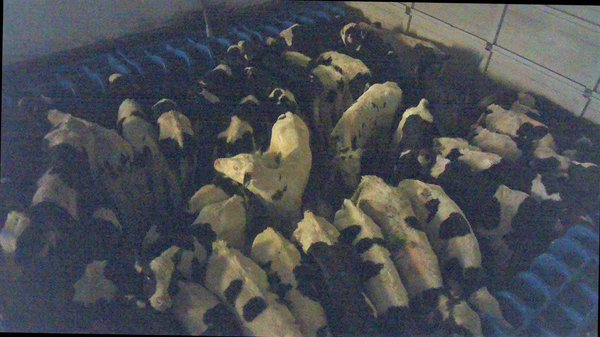
In addition, at the control post in Soppe-le-Bas:
- the required resting time of 24 hours was ignored and instead animals were loaded after less than 12 hours of rest,
- the animals were only supplied with electrolytes in the morning, even though they arrived at midnight,
- only one person rushed approximately 400 calves through the supply area, constantly beating the calves on their heads and backs.
4. Violations during long-distance transports of unweaned calves
Undue suffering was caused to the animals by the organisers, transporters, the operators of control posts and assembly centres and the competent authorities approving the vehicles and the stages of the long journey:
- Vehicles not equipped with adequate drinking devices for unweaned calves (Article 3 c), Annex I, Chap. VI, 1.3., 2.2. of Reg. 1/2005/EC);
- Certificate of approval for means of transport should not have been granted for the transport of unweaned calves (Article 18, Annex I, Chap. VI, 1.3., 2.2. of Reg. (EC) 1/2005);
- Unweaned calves are not fed according to their needs (Article 3 a), h), Annex I, Chap. V, 1.4. of Reg. (EC) 1/2005 and Article 5 c) of Reg. (EC) 1255/97));
- Unweaned calves suffered due to several stressful loading and unloading procedures (Article 3 a), f) of Reg. (EC) 1/2005);
- Control posts are places to rest animals for at least 24 hours (Article 1 of (EC) 1255/97 in connection with Annex I, Chap. V, 1.5. of Reg. (EC) 1/2005);
- Control posts should ensure according to Article 5 c) of Reg. (EC) 1255/97 that the animals staying at control posts are fed and watered at the right time according to the species involved and to provide appropriate quantities of feed and liquids for this purpose;
- Required 48 hours resting time according to Article 2 s), i) of Reg. (EC) 1/2005 ignored at assembly centres;
- Unfair competition amongst member states caused by non-harmonised interpretation and implementation of Regulation.
Assembly centres and control posts were contributing to the suffering of calves during transport due to:
- inappropriate and insufficient supply of calves,
- violations of requirements of Art. 2 regarding place of departure and place of destination,
- violating Art. 3 in connection with Annex 1, Chap. V of Reg. (EC) 1/2005.
This is an extract of our observations during long distance transports of unweaned calves and their deprivation from feed during the journey, at control posts and at assembly centres.
Full reports/footage/additional information can be provided on request.
